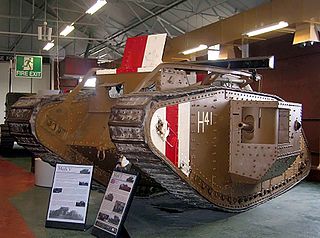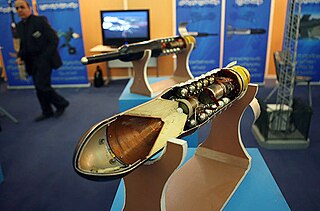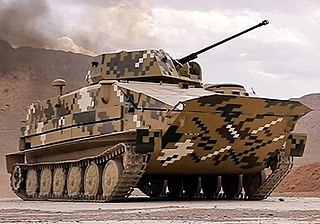
An armoured fighting vehicle or armored fighting vehicle (AFV) is an armed combat vehicle protected by armour, generally combining operational mobility with offensive and defensive capabilities. AFVs can be wheeled or tracked. Examples of AFVs are tanks, armoured cars, assault guns, self-propelled artilleries, infantry fighting vehicles (IFV), and armoured personnel carriers (APC).

An anti-tank guided missile (ATGM), anti-tank missile, anti-tank guided weapon (ATGW) or anti-armor guided weapon is a guided missile primarily designed to hit and destroy heavily armored military vehicles. ATGMs range in size from shoulder-launched weapons, which can be transported by a single soldier, to larger tripod-mounted weapons, which require a squad or team to transport and fire, to vehicle and aircraft mounted missile systems.

The 9M133 Kornet is a Russian man-portable anti-tank guided missile (ATGM) intended for use against main battle tanks. It was first introduced into service with the Russian army in 1998.

The BGM-71 TOW is an American anti-tank missile. TOW replaced much smaller missiles like the SS.10 and ENTAC, offering roughly twice the effective range, a more powerful warhead, and a greatly improved semi-automatic command to line of sight (SACLOS) that could also be equipped with infrared cameras for night time use.

Swingfire was a British wire-guided anti-tank missile developed in the 1960s and produced from 1966 until 1993. The name refers to its ability to make a rapid turn of up to ninety degrees after firing to bring it onto the line of the sighting mechanism. This means that the launcher vehicle could be concealed and the operator, using a portable sight, placed at a distance in a more advantageous firing position.

The Combat Vehicle Reconnaissance (Tracked), abbreviated CVR(T), is a family of armoured fighting vehicles (AFVs) developed in the 1960s and is in service with the British Army and others throughout the world. They are small, highly mobile, air-transportable armoured vehicles, originally designed to replace the Alvis Saladin armoured car.

The HJ-8 or Hongjian-8 is a second generation tube-launched, optically tracked, wire-guided anti-tank missile system which was originally deployed by the People's Liberation Army since the late 1980s.

The 9M113 Konkurs is a Soviet SACLOS wire-guided anti-tank missile.
A huge number of M113 Armored Personnel Carrier variants have been created, ranging from infantry carriers to nuclear missile carriers. The M113 armored personnel carrier has become one of the most prolific armored vehicles of the second half of the 20th century, and continues to serve with armies around the world in many roles.

The Saegheh is any of at least eight completely separate Iranian weapons systems: a rocket-propelled grenade (RPG) warhead, an anti-tank guided missile family, a surface-to-surface rocket, a target drone family, an air-to-air missile, a claimed stealth unmanned aerial vehicle, a fighter jet, and an anti-ship cruise missile.

The BMPT "Terminator" is an armored fighting vehicle (AFV), designed and manufactured by the Russian company Uralvagonzavod. This vehicle was designed for supporting tanks and other AFVs in urban areas. The BMPT is unofficially named the "Terminator" by the manufacturers. It is heavily armed and armored to survive in urban combat. The AFV is armed with four 9M120 Ataka missile launchers, two 30 mm 2A42 autocannons, two AG-17D grenade launchers, and one coaxial 7.62 mm PKTM machine gun.

Spike is an Israeli fire-and-forget anti-tank guided missile and anti-personnel missile with a tandem-charge high-explosive anti-tank (HEAT) warhead. As of 2024, it is in its sixth generation. It was developed and designed by the Israeli company Rafael Advanced Defense Systems. It is available in man-portable, vehicle-launched, helicopter-launched and maritime variants.
This is a timeline of the 2011 military intervention in Libya. It covers all military action taken by NATO to implement United Nations Security Council Resolution 1973, beginning on 19 March 2011.

Safir is an Iranian 4x4 multipurpose military vehicle built by Fath Vehicle Industries. The Safir weighs 1.5 tonne and is based on the M38. The jeep can be distinguished from the M38 due to the sharp angled body panels, hood and grille.

The Khordad 15 is an Iranian designed and built surface-to-air missile (SAM) system. The system was unveiled to the public on 9 June 2019 in an address made by Iranian Defence Minister Amir Hatami in Tehran, Iran. The system was developed by the Iran Aviation Industries Organization (IAIO). It has the capability to detect and intercept fighter jets, stealth targets, unmanned combat aerial vehicles (UCAV) and cruise missiles. It operates in conjunction with Sayyad-3 missiles. The surface-to-air missile system was developed in order to counter missiles and other aerial threats presented by the presence of extra-regional forces at military bases in countries around Iran. It was unveiled amid escalating tensions with the United States and Europe's failing attempts at upholding its commitments to the 2015 Iran nuclear deal.

The Makran IFV, an Iranian armoured personnel carrier (APC), is the highly modernized and upsized copy of the BTR-50 APC. The vehicle is produced and designed by the Research and Self-Sufficiency Jihad Organization. It was unveiled in June 2020 by the Islamic Revolutionary Guard Corps. The vehicle is named after the Makran coastal region, a region that stretches between Iran and Pakistan. While the Makran is technically an infantry fighting vehicle, it has a large troop compartment as it is based on the BTR-50, allowing it to dual function as an armoured personnel carrier.














